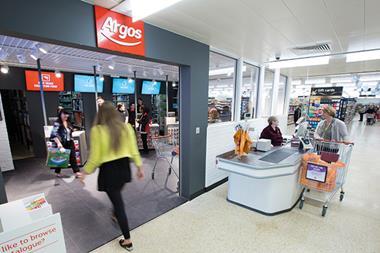Could the battle for retail survival get any more intense?

In the same week as House of Fraser confirmed plans to close stores as part of a CVA and Bench filed for administration – and just a fortnight after the Hammerson-intu deal collapsed – we woke up to the prospect of the mother of all defensive retail mergers.
There has been speculation for years over whether the big four supermarkets would one day become the big three, but the money was always on Morrisons doing a disappearing act, not two of them merging and no one actually disappearing. To say people were shocked when news broke of Sainsbury’s and Asda’s potential tie-up is an understatement.
They shouldn’t have been, though. After Tesco agreed the Booker acquisition, boosting its buying power and helping it counter the discounter threat, it was only a matter of time before the second- and third-biggest players made a move.
If Sainsbury’s and Asda do pull it off, they reckon they could slash 10% off the price of everyday items, the operative word being if. Sainsbury’s boss Mike Coupe, who would lead the merged entity, dismissed suggestions it would have to dispose of a large number of stores, banking presumably on the retention of both brands deflecting attention away from its monopoly position in some parts of the UK.
Whether he will still be so “in the money” once the Competition and Markets Authority has taken a closer look remains to be seen. Just because it was light-touch with the Tesco-Booker deal doesn’t mean it will be with Sainsbury’s-Asda. Experts think it would have to dispose of 15% of the combined estate if only competition among the big four is taken into consideration, falling to around 8% if Aldi and Lidl are factored in.
Find out more: What does Sainsbury’s-Asda merger mean for property?
Either way, that’s a decent chunk of space and who wants retail space at the moment? OK, Morrisons – and you would expect it to do something as the smallest by far of the big three (or should it still be four?) – and discount chains such as B&M and Home Bargains, but most of the stores are too large for Aldi and Lidl, and other retailers are looking to get rid of stores, not open new ones.
There are other exceptions, including Argos, of course, which would be rolled out across Asda stores if the deal gets the green light and was always considered a better fit for Asda shoppers than it was for Sainsbury’s anyway. The prospect of being able to build its Argos estate and capitalise on delivery infrastructure considered second only to Amazon’s, albeit by some distance, is not to be sniffed at. Could the new retail behemoth even become a domestic challenger via Argos to Amazon? It is not beyond the realms of possibility…

Another day, another housing secretary
More predictable was the news following Amber Rudd’s resignation that Sajid Javid was being shuffled out of his role as secretary of state for housing, communities and local government after just 112 days overseeing the housing bit, and that someone else was being shunted through the revolving door.
On his appointment, former Northern Ireland secretary James Brokenshire declared that “local government is in my blood”. Housing, sadly, not so much. Here we go again.
— PropertyWeek (@PropertyWeek) May 3, 2018





























No comments yet